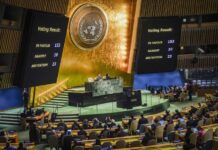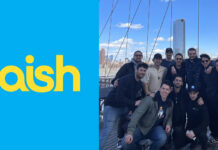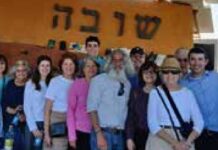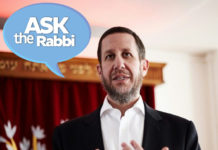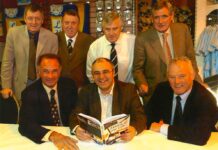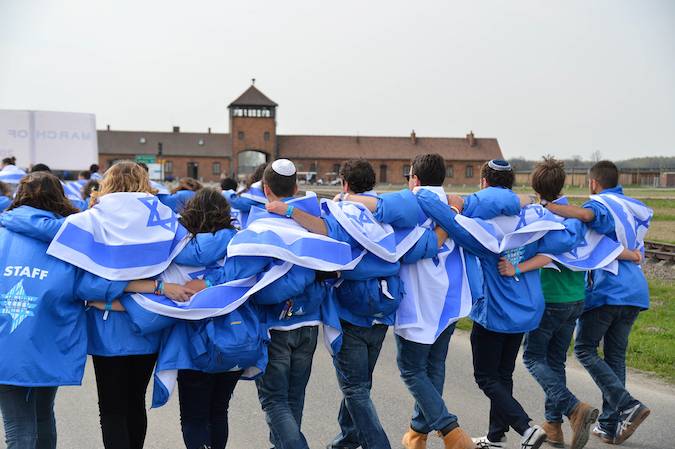
By David Saffer, reporting live from Poland
A 270-strong UK delegation marches from Auschwitz to Birkenau alongside 10,000 March of the Living participants from around the world today.
The 30th anniversary of March of the Living coincides with the 70th anniversary of Israel.
Amongst a packed five-day itinerary UK groups visited many Holocaust sites this week including the Warsaw ghetto, Majdanek concentration camp, Belzec death camp, Buczyna woods in Zbylitowska Gora, Krakow ghetto, Schindler’s factory, Okopowa Jewish cemetery, Polin Museum, Jewish Historical Institute, Yeshivas Chachmei Lublinand Krakow Kazimierz Jewish District and Auschwitz-Birkenau concentration camp.
UK’s MOTL delegation was funded by Scott Saunders and has participated since 2010.
“Its essential that we as a community keep learning and understanding the shortfalls of where hatred can lead to,” he said prior to flying out.
“The Holocaust shows us how low a human race can get when hatred for another people comes out.
“We should never be defined by the Holocaust but must learn lessons from the Holocaust. It is part of our history, which we have to understand.
“It’s about appreciating Jewish life, respecting fellow man, other peoples viewpoints and religions whilst understanding where hatred and intolerance can lead.”
In terms of preparation for March of the Living, education is key.
“I said at the beginning that the quality of education will define this programme and I have an amazing group of educators,” he explained.
“It’s about education not only about the Holocaust but also Jewish history.
“We work very hard bringing in top educators but we’ve also trained newer educators over the past couple of years and try bring them up to the way we think.
“Religious rabbis have become educators who take secular groups and secular Israelis and Jewish educators take religious people.
“This is a trip open to everyone, we don’t segment where participants come from in a community. We have rabbis, secular and non-Jewish people all on the same bus.”
Scott explained that the detailed programme covers Jewish life, the Holocaust and what is happening in Poland today.
“We engage with the local community and I’m not saying that because of legislation that has just come out over the last few months,” he said. “I’m talking about a resurgence of Jewish life in Poland, how Jews are seen and how they see their existence.
“This is important because a question we get asked is what happened after 1945.
“The answer is not simply Israel, which is some people’s answer. A lot more went on and that is very much part of the programme.”
A wide array of survivors accompanied participants.
Arie Shilansky, Ivor Perl and Arek Hersh were at Auschwitz concentration camp, Mala Tribich was at Ravensbrück concentration camp, Harry Olmer was in the Łódź Ghetto and Eve Kugler was a hidden child.
Scott is acutely aware he has to plan ahead.
“They are a crucial part of the programme,” he said.
“I’ve heard their stories and could tell them to some extent but clearly not through their eyes.
“When the time comes when they are unable able to come with us it will become even more important to talk about Holocaust history and learn lessons of the past because more people will deny it when there are less to defend it.”
This is Scott’s 12th MOTL but he also takes six trips to Poland each year to aid his preparation.
“The Jewish history of Poland and Polish history are intertwined, you have to understand both and that is an ongoing process,” he explained.
“You cannot learn it in a week, in a semester or a in a single book. To understand Jewish history you have to understand some Polish history because they are so tightly interwoven.”
He added: “To understand Holocaust history could take you several lifetimes, it is so complex.
“I’ve said many times, the Holocaust is not Auschwitz and Auschwitz is not the Holocaust.
“On any given day 10-12,000 people arrived at Auschwitz for processing.
“A mere handful survived but the Holocaust is much, much bigger, the scale is unimaginable.
“You can’t begin to contemplate the history and one of the things we say is that if a participant comes home with the answers then we have done a bad job.”
He continued: “I’m hoping participants come home with more questions because it’s not possible to answer questions about the Holocaust that you want to ask.
“Every time you think you have an answer you turn a corner and come up with another question. Everything was a dilemma after a dilemma after a dilemma regardless of which way you turn. It is an enormous topic.
“We have had the pleasure of meeting through March of the Living greatest historians and scholars including the wonderful, late David Cessarani.
“And they would be the first to turn around and say however much I’ve written or knowledge I have it’s an ongoing process. It keeps throwing something else at you, another theory, another story, you keep learning.”
Every delegation is different and it’s this aspect that motivates Scott to continue driving the initiative forward.
“We’ve taken almost 2,000 people since we started and participants make it different each year,” he explained.
“They have different views, questions and ways of looking at things.
“Every year it’s a wonderfully engaged group that get deep into this topic, they are passionate about it, even if it’s for a tiny window of their lives, and that makes each trip exciting, enthralling and nerve wreaking.
“We sit up till the early hours chatting, everyone wants to talk about their day and what the next day will bring. It’s a unique experience.”
Eli Schryer heads up logistics for UK participants who are traveling from Heathrow, Luton, Manchester, Birmingham and Leeds airports.
The UK delegation is the largest to date and biggest delegation from Europe.
“Every year the number of participants grows,” he said.
“A handful joined international groups in the first year but it was so successful it built to 50 people. Last year we had 250 and now it’s grown again.
“We have seven buses with its own schedule.”
He added: “We’ve perfected the trip for the British group.
“Educators are geared for each group of adults, students and youth movements.
“There are also staff members available for participants.
“Educators and bus leaders watch the groups all the way through and run feedback sessions in the evening where everyone talks about what they learnt, experienced and felt.
“It’s a massive project. There are a lots of ways of going to Poland but there is something special about MOTL.”
Aside from MOTL UK participants, Chelsea FC has sent a delegation on the back of its ‘Say No To anti-Semitism’ campaign at the club.
Former manager Avram Grant, club directors Bruce Buck and Eugene Tenenbaum, Olympic legend Sir Steve Redgrave, U18 manager Jody Morris, and academy players are among the Blues group.
“Having relatives who died in Auschwitz, it is very special for me to join this march,” said Grant, whose father was a Holocaust survivor and has recently gained Polish citizenship.
“Auschwitz stands for indescribable sadness and evil, but my father taught me to always remain hopeful. Despite all his struggles, he was the most optimistic man in the world and believed that always, in every situation, there is hope.
“I am very humbled to come back with my former team Chelsea to honour the lives lost and unite together for a brighter future.”
MOTL’s founder commented: “Avram was a tremendous help to the UK when we first started.
“The fact there is a group from Chelsea FC can only be another positive step to the ongoing work taking place across the country to combat all forms of hatred and anti-Semitism.”
Chelsea club chairman Buck added: “We are honoured to participate and pay our respects to the millions of Jews who lost their lives in the Holocaust.
“Anti-Semitism has been on the rise around the world for some time now and it is in this context, and with the full support of the club’s owner Roman Abramovich, we recently launched an initiative to raise awareness of and tackle anti-Semitism in all its forms.”
Redgrave, who participates in an ambassadorial role, commented: “Sports can play an important role in bringing people together and Chelsea’s efforts to tackle anti-Semitism is a good example of how clubs can contribute in promoting unity and tolerance.”
Watch out for a review of the MOTL trip in next week’s edition.



